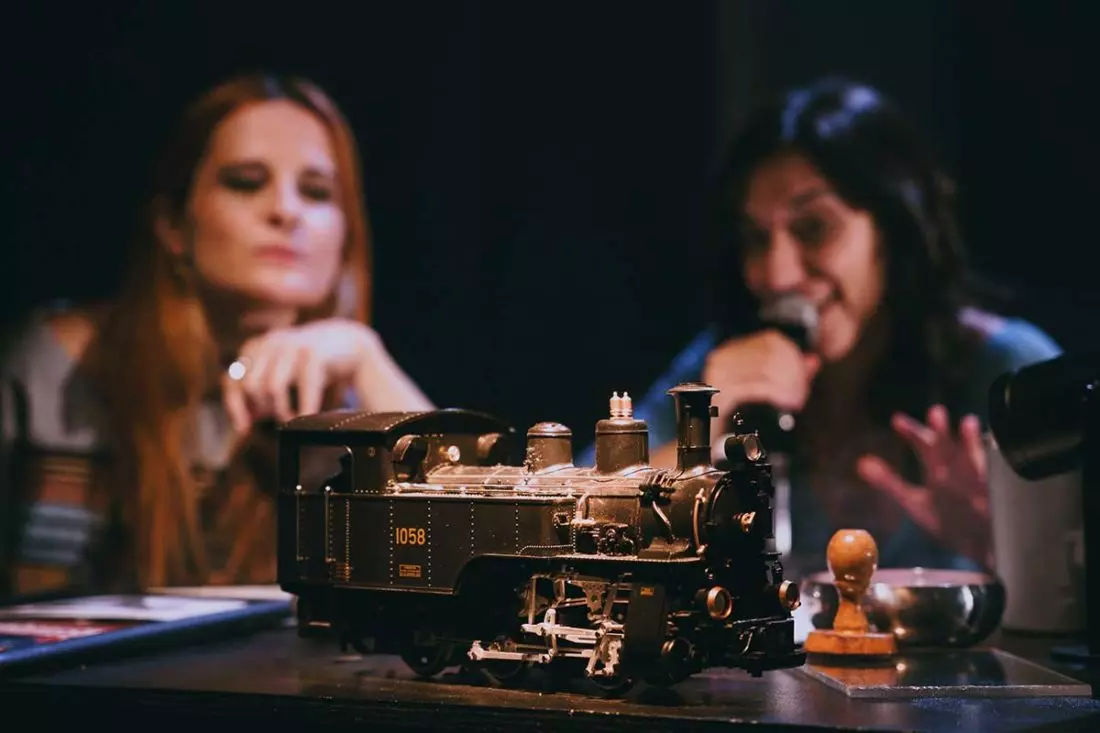Esther Isla: “Corruption is not a current fact but comes from a long time ago”
“The fact that you do not feel passion for braids, that you are not interested in them at all, that you hate them or even that they disgust you, does not mean that you do not need to know their history”
Thus begins the synopsis of Brief history of the Spanish railwaya piece written by John Yagoin tribute to his historian mother, which arrives at the National Theater of Catalonia after opening and selling out tickets at the Teatro María Guerrero of the Centro Dramatic Nacional in Madrid. The piece is directed by Beatriz Jaen and starring Paloma Córdoba i Esther Islatwo actresses who neither on stage nor behind the scenes stand still for a moment. His exercise of going through many years of our history and several characters who won a space for the misdeeds they did does not cease to surprise us already at the end of 2024.

Teatre Barcelona: It is a piece that has never been seen in Barcelona. What will the public who comes to see it discover?
Esther Isla (EI): He will discover a relationship, which even I did not know, between the railway business and Bourbon corruption. You will see a very narrative work with a great sense of humor and it will be shocking because it surprises a lot.
Do you think there is a generational difference in the reception of the piece?
Paloma Córdoba (PC): I suppose yes, that there must be because of the bond that is generated between different generations with the royal house, in this case. I think that for the previous generation, that of our parents, there is a strong link because they lived through the time of those who helped make the Transition and grew up with the idea that, without the king, it would not have been possible. And then they suffered a great disappointment. What I don’t know is what connection young people have with it now.
HE: The generation of our parents is the one that has experienced the whitening, from my point of view, of the figure of the king, since he has been known as someone very close. I think young people spend a little more now.
pc: I don’t know if they wonder why these people are here and what their importance is. What does happen is that when we finish the function, even if people are perplexed, few people are surprised. No one is surprised that all this has happened, and this also draws our attention.
Esther Isla: “What the work explains has nothing to do with the ideological or political condition since no one can deny what happened”
Capitalism, the royal family, politics… All full of Spanish picaresque. Will there be or is there anyone who has come to see the play and been scandalized or offended?
HE: Last season I felt they got pissed off less than I expected. Because I feel that what the work explains has nothing to do with the ideological or political condition since no one can deny what has happened and what is happening to this day. I thought more people would get up and leave, but no one can deny the evidence. Then the audience comes in and empathizes with what we’re telling.
pc: The text tells you some facts and these facts make you irrevocably take sides, but it doesn’t tell you from a position and doesn’t tell you what or how to think. This makes it very hard to get mad at us. What you can breathe, especially if you go out talking about the work and share it with people, is the indignation and surprise to discover that corruption is not a current fact but comes from a long time ago. This is fascinating and perplexing. When the audience laughs it’s because they need to let go of that tension by realizing it.
HE: What I do wonder is how long people will be able to continue swallowing all this without lifting a finger and accepting it, beyond the law of judicial inviolability…
pc: Or if someone will question that “who is now occupying this high position has nothing to do with the previous one, it is a person with a different education and values”. Because this speech is what we are sold and have been sold to us over the years.

What opinions and reactions did you receive last season with the play in Madrid?
pc: For people who knew the text, the assembly was a surprise because it is true that the direction of Beatriz Jaen she is wonderful It was intended as a monologue, which takes you to the conference sooner, and not as a play for two actresses. Beatriz contributed her universe, which is brutal, and has thrown a party.
What cost you more to learn, the text or all the technical part and scene changes?
pc: Integrate the two worlds because when you think you already have the text, the whole universe of changes appears for almost two hours and surprises you.
HE: Both things were difficult because the text is long and has a lot of data. And the technique is very demanding too. All of this is very intense because we are not only characters, we are historians, researchers and storytellers who must know how to explain.
pc: This also makes it demanding for the audience because the feature needs the audience to be very involved.

Have you ever missed a train in your life that really pissed you off?
pc: Many, yes. But then you stay at the station and things happen. Then, I think the point is to know how to see that there is also life and movement at the station, that another one can pass or you can take a taxi and arrive by another route.
HE: I learned from a director, from José Gómez-Frihathat “when a train passes you have to catch the next one and forget what has already happened.
Describe to me in one word the journey you are taking with this work.
HE: Rock and roll.
pc: Fascinating
More information, images and tickets at:









